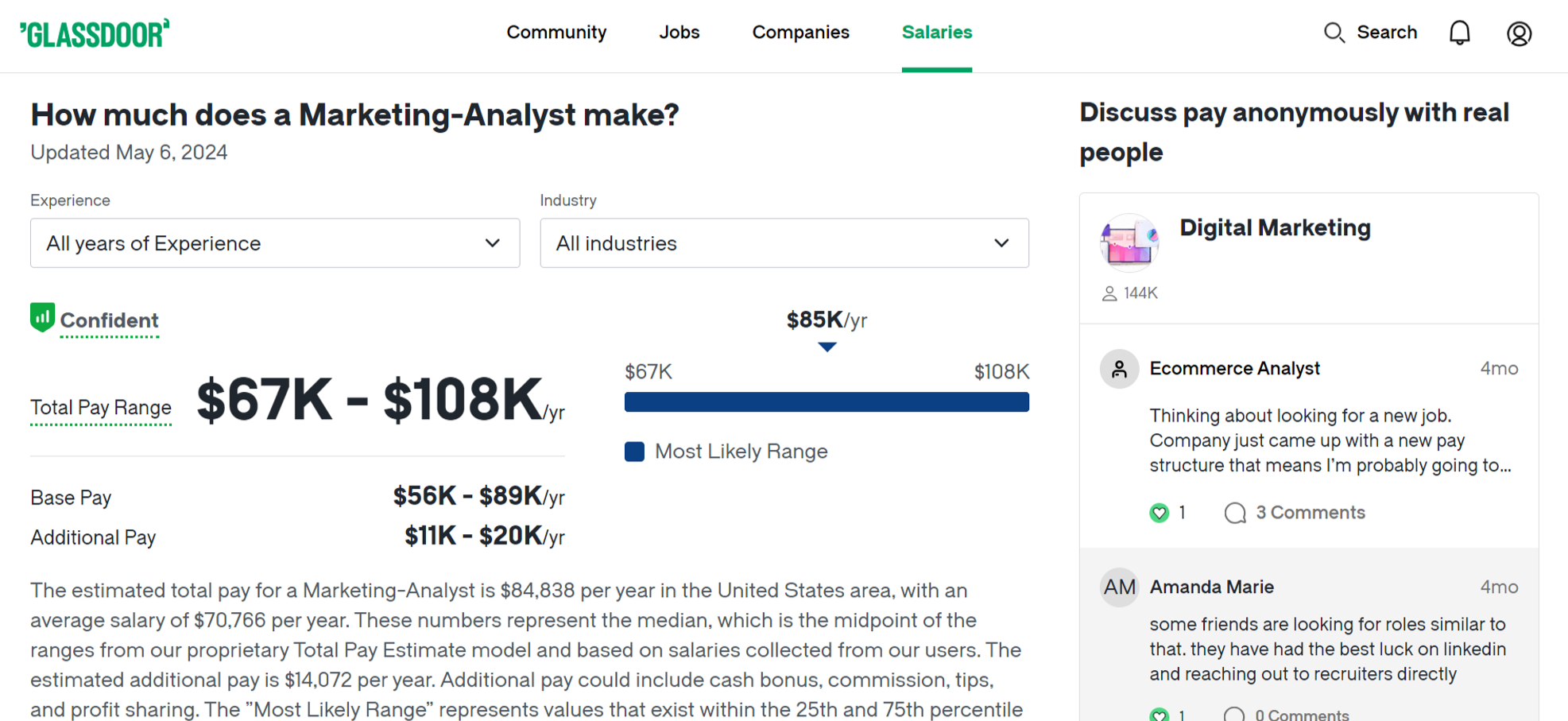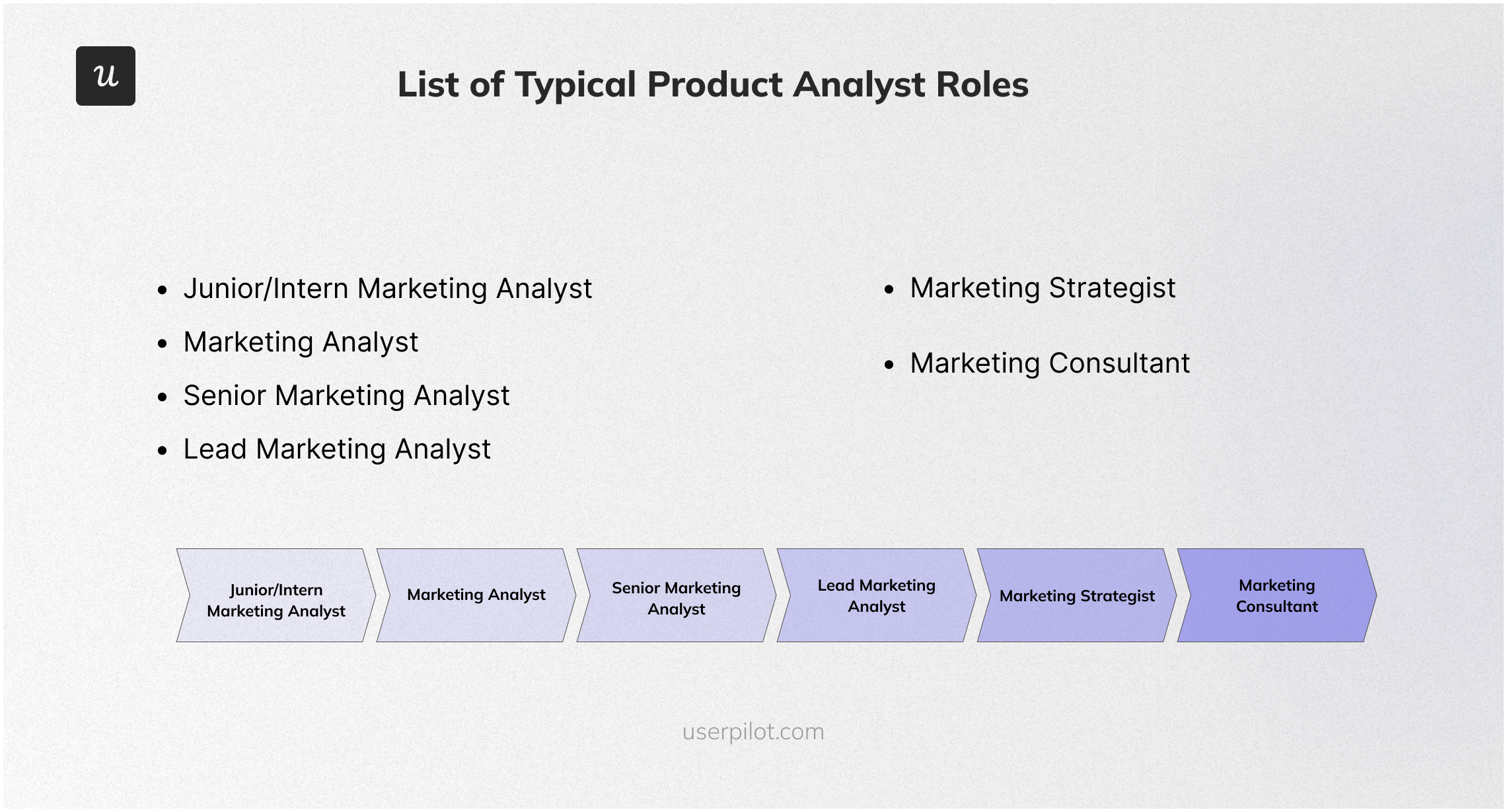![Marketing Analyst Salary [+ Resources to Advance]](https://blog-static.userpilot.com/blog/wp-content/uploads/2024/06/Marketing-Analyst-SalaryResources-to-Advance-450x295.png)
Try Userpilot Now
See Why 1,000+ Teams Choose Userpilot

How much does a marketing analyst make?
According to Glassdoor, the median estimated total pay of a marketing analyst in the United States is $84,838 per year, with an estimated salary of $70,766.
However, the salary of a marketing analyst varies due to some factors such as years of experience, the sector you work in, and where you live. In this section is a detailed breakdown of the salary of a marketing analyst, starting with the level of experience:
Junior Marketing Analyst (1-3 years): $64K – $95K/year
Senior Marketing Analyst (4-6 years): $67K – $104K/year
Lead/Principal Marketing Analyst: (7+ years): $71K/year and above
Secondly, your industry of work affects your salary. For instance, if you work in the healthcare sector, your salary may differ from when you are working in the Information and Technology sector.
According to Glassdoor, here are the top 3 sectors where the marketing analyst earns the most total pay:
- Information Technology: $109,919/year
- Energy, Mining, and Utility: $94,835/year
- Pharmaceutical and Biotechnology: $92,329/year
Your location also affects your salary, especially with remote working where company employees may live in different countries around the world, and with different standards of living. Here are the midpoint salaries for some of the biggest cities in the United States.
- San Francisco: $91,662/year
- New York: $104,135/year
- Boston: $73,398/year
- Washington DC: $77,160/year
- Chicago: $83,533/year
Marketing analyst career path
The marketing analyst career allows for room for growth as your skillset and years of experience increase. Here is a typical career path for a marketing analyst:
- Junior/Intern Marketing Analyst: This is a junior role where you get to learn how to use market research and data analysis tools. You also learn to learn more about marketing channels and how to monitor performance and gather marketing data.
- Marketing Analyst: The marketing analyst is a more senior position where you take on more responsibilities, such as marketing data analysis, visualization, and reporting. In this role, you report to the senior/lead marketing analyst.
- Senior/Lead Marketing Analyst: The Senior/Lead marketing analyst oversees all activities related to marketing analysis for the company.
- Marketing Strategist: From the data obtained from marketing analysis, the marketing strategist develops growth strategies to guide and improve the company’s marketing. Using their expertise, they also forecast future market trends.
- Marketing Consultant: The marketing consultant role is one of the highest roles in marketing analysis, where you are consulted for marketing strategies due to your expertise. You vet marketing data and strategies to identify growth opportunities.
Best practices to be a great marketing analyst
To become a marketing analyst who excels at their tasks and stands out in the marketing team, here are the best practices to follow:
- Keen eye for details: Having a keen eye for details is essential to being a great marketing analyst as it enables you to draw relevant insights from data. Being detail-oriented means you can spot small trends and make sense of them.
- Goal setting and KPI monitoring: Marketing analysis involves interfacing with stakeholders, other members of the marketing team, and sometimes users in the process of research. Goal setting helps you prioritize what matters at each point in time. KPI monitoring also helps you keep track of your performance and identify where you are lagging and where to improve.
- Researching well and choosing the right tools: The right marketing research tools give you valuable insights, while the right operations tools make your work efficient and organized. Before you invest in tools, carry out enough research about them and ensure they are the perfect fit for you.
- Effective communication: As a marketing analyst, you should be able to present your insights. You can take online courses on communication on platforms like Udemy and Coursera to improve your communication skills.
- Willingness to Learn: Openness to learn new skills, tools, and research methods makes for a great marketing analyst. Marketing is constantly evolving, and you must be ready to evolve with it to stay relevant.
Best resources for marketing analysts
Marketing is constantly evolving. To stay on top of your game as a marketing analyst, you need to access resources regularly. This ranges from blogs to webinars to podcasts and books. We’ve curated the best resources for a marketing analyst:
Best books for marketing analysts
- Digital Marketing Analytics: Making Sense of Consumer Data in a Digital World By Chuck Heeman and Ken Burbarry: The book explains how to get maximum insights from marketing data and translate them into actionable information that can influence and change your marketing game
- Successful Analytics: Gain Business Insights by Managing Google Analytics by Brian Clifton: One peculiar fact about this book is that it is tool-specific. It focuses on how you can get marketing data from Google Analytics, a tool every marketing analyst should learn how to use.
- Marketing Analytics: Essential Tools for Data-Driven Decisions by Rajkumar Venkatesan, Paul W. Farris, and Ronald T. Wilcox: With practical examples, the book teaches how to identify the data that matters and use it to drive actionable insights.
Best webinars for marketing analysts
Marketing analysts play a critical role in measuring and optimizing marketing campaigns. So here’s a list of helpful resources for you to grow your analysis skills:
- Userpilot Events focuses on product growth and user onboarding, which are crucial aspects for understanding user behavior and optimizing marketing campaigns. Their webinars delve into user journey optimization, feature adoption analytics, and user engagement strategies – all feeding directly into your marketing analytics efforts.
- Tableau frequently hosts webinars on data visualization using their popular software. You can also find webinars on broader marketing analytics topics like campaign attribution and marketing ROI measurement.
- eMarketer (Consider a free trial or membership for full access) offers webinars and research reports on various marketing topics. Gain insights into industry trends and consumer behavior to inform your marketing analytics strategies.
- Singular specializes in marketing attribution solutions and offers webinars on building effective attribution models and optimizing marketing campaigns based on data insights.
Best blogs for marketing analysts
- Userpilot Blog: The userpilot blog is a comprehensive blog with valuable resources that provide insights into market and user research.
- Adverity Blog: The adverity blog focuses on how to make sense of marketing data to drive company growth.
- Decision Analyst Blog: The blog focuses on how to conduct market research and analyze consumers.
Best podcasts for marketing analysts
- Marketing and Analytics by Alexander Sofranas: This is a podcast by Alexander Sofranas that combines marketing and analytics and is one of the best podcasts for a marketing analyst who wants to learn and stay ahead of trends.
- The Marketing Intelligence Show by Supermetrics: The podcast is like an interview with different marketing analysts and seeks to find out how they use data to make informed company decisions and drive growth.
- AnalyticsToday Podcast by Jeremy Roberts and Sameer Khan: In the podcast, Jeremy interviews some core data leaders in the world and interviews them on data-related topics.
Best tools for marketing analysts
Tools are a critical part of a marketing analyst’s work and determine how efficient you are. Here are the best tools for marketing analysts:
- Best Tool for Product and User Research (Userpilot): Userpilot gives you adequate insights into your product and your users.
- Best Tool for Business Intelligence (Tableau): Tableau is a business intelligence tool that helps you present your market research findings to people with ease.
- Bes Tool for Data Analysis and Reporting (Power BI): Power BI is one every marketing analyst should learn for data analysis and visualization for easy reporting.
- Best Tool for Visualization (Google Charts): Google Charts is one of the best tools for data visualization as it helps you present your data in charts and graphs.
- Best Tool for Project Management (Notion): A marketing analyst must be able to stay organized and manage their products effectively and Notion is an excellent project management tool.
Conclusion
Now that you have a better understanding of the salary range for a marketing analyst position, you can take steps to improve your earning potential. Consider pursuing relevant certifications, developing your skillset, or negotiating effectively during the job offer stage.
Looking into tools for marketing analysts? Userpilot is an all-in-one product platform with engagement features and powerful analytics capabilities. Book a demo to see it in action!









